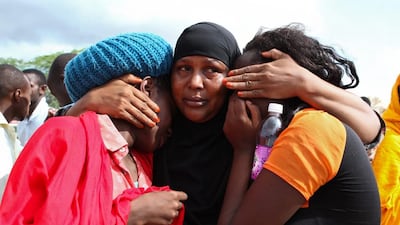NAIROBI // Quietly weeping, families desperate for news of sons and daughters feared killed in the Kenya university massacre wait for hours at a morgue in the capital Nairobi.
Cargo planes carrying corpses were flown Friday afternoon from the northeastern town of Garissa to Nairobi after Thursday’s killing spree by Al Shabab militants in which 148 people were killed, mostly students.
“I cannot talk,” were the last whispered words from Salome, a 20-year-old economics student, to her father Peter Wainaina about an hour into the attack. Then she hung up.
Mr Wainaina, 72, called his daughter back after receiving a terrible text message: “Al Shabab is killing us. Goodbye. If we don’t make it, I loved you all.”
“After that I tried later but her phone was off,” he said. “Since then I have no news – I called the registrar of the university, but he could not give any information.”
He waits with around a hundred others who are sitting in tents erected on the morgue car park. They wait in sombre, dignified silence, some quietly weeping.
Inside the morgue, 20 bodies lie on stretchers on the ground, in front of the doors of refrigerated cabinets.
The bodies are draped with a sheet, but their faces are revealed: 11 men on one side, nine women on the other.
The day-long siege of Garissa University was Kenya’s deadliest attack since the 1998 bombing of the US embassy in Nairobi, and the bloodiest ever by the Al-Qaeda-affiliated militants.
The Kenyan government, however, vowed that it would not be “intimidated”.
On Friday, Sheikh Khalifa bin Zayed Al Nahyan, President of the UAE, sent a cable to the Kenyan president, Uhuru Kenyatta, expressing his condolences for the massacre’s victims, and expressing the UAE’s solidarity with Kenya.
Pope Francis led worldwide condemnation of the attack, with the European Union pledging to support Kenya’s fight against extremism.
“The EU’s solidarity at this time is assured, and we will work on reinforcing our support for Kenya’s counter-terrorism efforts,” said the EU’s foreign policy chief, Federica Mogherini, adding that it was “important that all play their part”.
Survivors of the massacre recounted how the masked gunmen taunted students before killing them, including forcing them to phone their parents, urging them to call for Kenyan troops to leave Somalia – before shooting them anyway.
As the gunmen prowled university rooms hunting for more people to kill, some students smeared blood from dead friends over their bodies to pretend that they too had been shot.
“There were bodies everywhere in execution lines, we saw people whose heads had been blown off, bullet wounds everywhere, it was a grisly mess,” said Reuben Nyaora, an aid worker who helped the wounded.
Others appeared to have been killed by knives.
The siege ended with four gunmen being killed in a hail of heavy gunfire, and one suspect reportedly arrested. At least 79 people were also wounded in the attack on the campus, which lies near the border with Somalia.
On Friday, a huge crowd of shocked and traumatised survivors, and relatives of those killed or missing, gathered at the university gate.
“I am so worried, I had a son who was among the students trapped inside the college, and since yesterday I have heard nothing,” said Habel Mutinda, an elderly man, his face streaming with tears.
“I tried to identify his body among those killed ... I have to do that before the body goes bad in the heat.”
Emergency workers set about collecting the bodies, while Kenyan soldiers patrolled the campus.
Several buses were transporting traumatised students from the university – now ordered to close permanently – back to their home areas.
Visiting the scene of the carnage, interior minister Joseph Nkaissery vowed that his country would not give in to Al Shabab, who, despite losing territory inside Somalia, have stepped up operations in Kenya.
“Kenya’s government will not be intimidated by the terrorists who have made killing innocent people a way to humiliate the government,” Mr Nkaissery told reporters, promising that the government would “fight back”.
“We shall win this war against our enemies.”
A US $215,000 (Dh 789,737) bounty was offered for the capture of alleged Al Shabab commander Mohamed Mohamud, a former Kenyan teacher believed to now be in Somalia and said to be the mastermind of the Garissa attack.
Local newspapers said on Friday that intelligence warnings had been missed.
"The attack was preceded by a number of intelligence alarm bells," The Star newspaper said.
But despite such criticisms, newspapers also called for national unity in the wake of the killings.
"Even as we struggle to rise from the rubble of yesterday's attack, we must once again realise what the enemy wants to trigger," The Standard's editorial read. "They want an internal war in Kenya."
* Agence France-Presse and Wam

